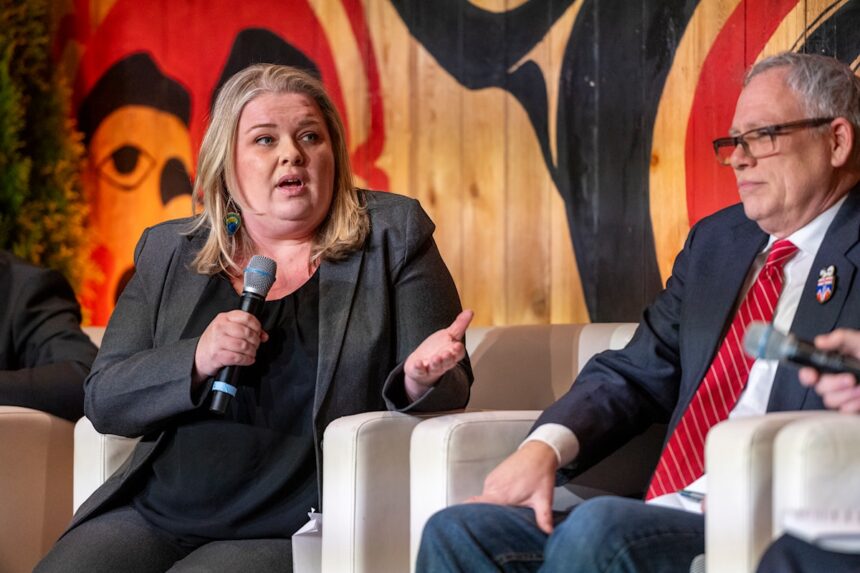Education Minister R.J. Simpson has ordered an independent review of the Dehcho Divisional Education Council after mounting concerns about student outcomes and administrative challenges in the region.
The announcement comes following what Simpson describes as “several years of concerns” about the educational system’s effectiveness in serving Dehcho communities. The review will examine everything from classroom instruction to administrative operations across the region’s schools.
“This is about ensuring every student in the Dehcho has access to quality education that prepares them for their future,” Simpson said during a press conference in Fort Simpson last Thursday. “We’ve heard community concerns, and we’re taking action.”
The decision follows troubling attendance statistics. According to the N.W.T. Education Department’s latest figures, attendance rates in some Dehcho schools have fallen below 60 percent—significantly lower than the territorial average of 83 percent. Graduation rates have also declined over the past five years, with fewer than half of eligible students completing their high school education last year.
Local parent Sarah Nadli welcomed the announcement. “Our kids deserve better. Too many of them are falling through the cracks,” she told me at a community meeting in Fort Providence. “We need schools that respect our culture while preparing our children for whatever path they choose.”
The review will be led by Dr. Melanie Burke, a former superintendent with extensive experience in Indigenous education systems. Her team will visit all seven schools in the region, meeting with staff, students, parents, and community leaders starting next month.
Chief Stanley Sanguez of the Jean Marie River First Nation emphasized the importance of Indigenous involvement in the process. “Education in our communities must reflect Dene values and knowledge. We need to be at the table as equal partners, not just consulted after decisions are made.”
The Dehcho region faces unique educational challenges. Many communities are accessible only by winter roads or air travel. Teacher recruitment and retention remain persistent issues, with some schools experiencing staffing turnover exceeding 40 percent annually. These realities have complicated efforts to provide consistent, culturally responsive education.
Former teacher James Pokiak, who worked in Fort Simpson for twelve years, pointed to systemic issues beyond the classroom. “You can’t separate education from housing, from healthcare, from the intergenerational trauma in our communities,” he said. “This review needs to acknowledge these connections.”
The territorial government has allocated $450,000 for the review, which will include a comprehensive analysis of financial management, curriculum implementation, and staff development programs. The final report is expected by March 2023, with recommendations to be implemented beginning the following school year.
Not everyone sees the review as positive. Dehcho Grand Chief Jackson Lafferty expressed concerns about potential territorial overreach. “We support improvements to education, but this feels like another example of decisions being made for us, not with us,” he said in a statement released Friday. “True educational reform must respect Dehcho governance and self-determination.”
The teachers’ union has also raised questions about the review’s scope. Northwest Territories Teachers’ Association president Matthew Miller cautioned against placing blame solely on educators. “Our teachers are working incredibly hard in challenging circumstances. We need to ensure this review addresses systemic barriers like inadequate resources and infrastructure.”
Education advocates across the territory are watching closely. Similar reviews in the Beaufort Delta and Sahtu regions led to significant changes in educational delivery models, including greater emphasis on land-based learning and Indigenous language revitalization.
Diana Gargan, an education consultant who has worked extensively in northern communities, sees potential in the process. “When done properly, these reviews can be transformative. The key is ensuring recommendations are actually implemented with proper funding and community ownership.”
For students like 16-year-old Jeremy Sake from Fort Simpson, the stakes couldn’t be higher. “I want to study engineering, but sometimes I wonder if I’m getting what I need to succeed in university,” he told me. “It’s not just about having schools in our communities—it’s about having good schools.”
The Dehcho review represents part of a larger territorial education strategy aimed at improving outcomes for all northern students while addressing the unique needs of Indigenous communities. Simpson emphasized that the review would respect the spirit of reconciliation and the calls to action from the Truth and Reconciliation Commission.
“This isn’t about imposing solutions,” Simpson said. “It’s about creating space for honest dialogue about what’s working, what isn’t, and how we can do better for Dehcho students.”
Community engagement sessions will begin in Fort Simpson next month before expanding to other Dehcho communities.






